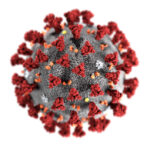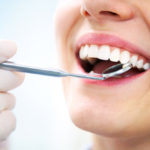Teeth Tips for Athletes
Three teeth tips that all athletes should know.
Athletes need to take care of their teeth both on and off the field. “Most athletes are careful about what they eat and their workout routine. Part of that routine should include taking care of your mouth and teeth every single day,” says Dentist Dr. Thomas Long. “It would be a shame to miss practice or a game because you are in the dentist’s office receiving treatment or recovering from a dental surgical procedure.”

Here, Dr. Long shares his playbook for a healthy mouth.
1. Make a Mouthguard Part of Your Uniform
Helmet? Check. Knee pads? Check. Mouthguard? Check! Mouthguards usually cover your upper teeth and protect your teeth, lips, tongue, face and jaw against injuries, so they need to be part of your uniform in any sport you play.
Wearing a mouthguard regularly becomes second nature. It does not matter what type of mouthguard you choose, just make sure it fits properly. “The athletes I see feel better when they start wearing them, and they feel a little naked without them after they get used to them,” Dr. Long says
In fact, many sports won’t let you play without one. Dr. Long says USA Hockey requires all youth players to wear a mouthguard. “The referees have to be able to see it, and it has to be colored,” he says. “I think that’s a great idea.”
2. Sideline Sugary Sports Drinks
If you need to quench your thirst, reach for water instead of a sports drink. “People are trying to rehydrate, but there may be a lot of sugar in those drinks,” Dr. Long says.
The bacteria in your mouth will use the sugar from your sports drink to produce an acid that weakens the hard outer shell of your teeth, which may increase your risk for cavities over time.
In his experience with the Hurricanes, Dr. Long says he doesn’t often see professional athletes drinking sports drinks. “Their diets are so well-managed they just don’t have a lot of sugar,” he says. “They make their own sports drinks, and they’re more high-protein shakes than sugary sports drinks.”
3. Brush, Floss, Rinse, Repeat
Practice makes perfect when you’re mastering the skills of any sport, so do the same with your daily dental habits. Dr. Long says an unhealthy tooth is more likely to be damaged if a sports injury happens. “A tooth that has had a lot of decay and a lot of fillings is nowhere near as strong as a tooth that has not had decay and has not had a lot of fillings,” he says.
Keep your smile strong by brushing twice a day for two minutes and flossing once a day. Then, in the home stretch of your daily dental routine, use an ADA-Acceptedmouthwash.
See full article on MouthHealthy.org
If you have any questions about protecting you or your child’s teeth, call Prima Family Dental at 781-944-4450 and make an appointment with us today.



